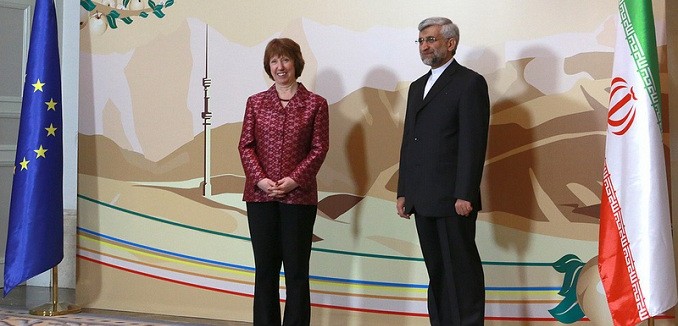Negotiations over Iran’s disputed nuclear program broke off on Saturday without signs of even incremental progress… The failure to reach any accord was a serious setback for the talks… After the conclusion of two days of tense bargaining, Catherine Ashton, the European Union’s foreign policy chief, said that after “long and intense discussions” it was clear that the sides “remain far apart on the substance.”
The New York Times goes on to note that the near-total failure of the so-called Almaty II talks is “striking” given optimistic analysis from some foreign policy specialists to the effect that progress was in the interest of all sides:
The conclusion of the talks without even a modest confidence building measure or the clear prospect of future talks was striking given that all sides seemed to have incentives to keep the conversation going, and avoid talk military intervention… Western officials had arrived here with guarded optimism…
Ahead of the latest round of talks, Western officials were adamant that they expected Iran to offer a direct response to that package. Instead, after the first morning of discussions on Friday, the Iranians said that they had offered a new “comprehensive” proposal aimed at building cooperation. The big powers expressed surprise and confusion, saying that they had not heard anything that sounded like a new plan. The Iranian side later clarified that it presented a “scaled down” version of a package first proposed in talks in Moscow in June 2012, which was quickly rejected.
In contrast to Western evaluations, Iranian officials emerged from this weekend’s talks relatively upbeat about the potential for future concessions from the West. The stark contrast between Iranian and Western evaluations mirrors the responses that each side provided after the last round of P5+1/Iran talks, which took place in February.
No date has been for the resumption of negotiations, and the U.S. has in the last hour suggested that talks may have to wait until after Iran’s June election. Iran’s chief nuclear negotiator Saeed Jalili recently declared that the country would actually harden its negotiating stance after the elections.
The delay is likely to deepen the increasingly pitched worries of Arab states about the Iranian nuclear program. Tensions between Iran and its Arab neighbors have spiked in recent months, and the Gulf Cooperation Council now routinely criticizes Tehran for pressing regional territorial claims and for fomenting domestic unrest inside the borders of Arab states.
Arab nations have long feared that Iran would use the immunity provided by nuclear weapons to broaden its activities in the Middle East. A nuclear shield, they fear, would allow Iran to further pursue its territorial ambitions, which include the entire nation of Bahrain. Saudi Foreign Minister Saud al-Faisal recently blasted a framework of open-ended negotiations with Iran, which Faisal warned would allow Iran to acquire nuclear weapons. In July 2010, the UAE’s ambassador to the United States publicly made the case that the benefits of bombing Iran’s nuclear installations outweighed the costs, and cables emerged later that year indicating that Saudi Arabia had privately urged U.S. officials to take military action against Iran’s nuclear facilities.




